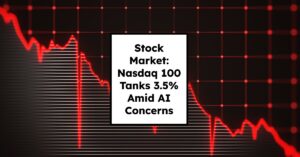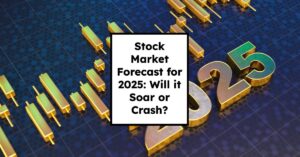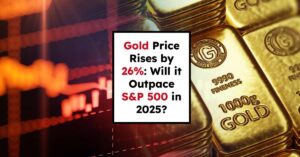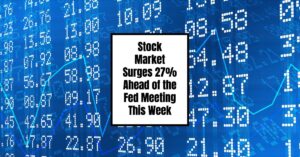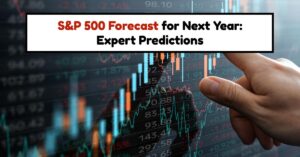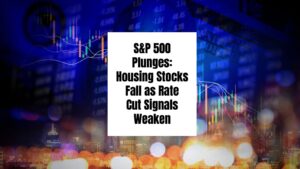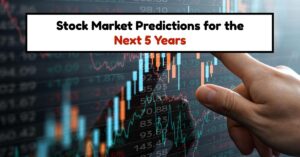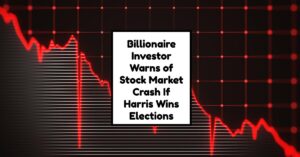The US stock market experienced a significant jolt recently, with the Nasdaq 100 index plunging by 3.5% primarily due to concerns surrounding the rapid advancements in AI technology, particularly from Chinese competitors. This sudden downturn sent shivers down investors' spines, triggering a sell-off and raising questions about the future dominance of US tech companies. This isn't just another dip; it's a wake-up call reflecting the intense global competition and its impact on the stock market.
Stock Market Crash: Nasdaq 100 Tanks 3.5% Amid AI Concerns
A Closer Look at the Nasdaq 100 Plunge
The Nasdaq 100 is essentially a who's who of tech giants and innovative companies. When it falls, the tech world holds its breath. The sharp 3.5% drop on January 27, 2025, wasn't just a bad day at the office; it was a symptom of deeper anxieties. At the heart of this chaos was the unveiling of groundbreaking AI capabilities by a Chinese startup, DeepSeek.
Think about it – a company seemingly out of nowhere suddenly poses a threat to established American titans, that’s a recipe for panic. The announcement suggested the possibility that US tech firms may soon find themselves on the back foot, a fear that quickly materialized as investors rushed to sell.
This single event had a domino effect. Investors, suddenly unsure about the future, began unloading their tech stocks. This selling spree affected almost all companies on the Nasdaq, with the technology stocks bearing the brunt of the downfall. It showed that in today’s world, tech leadership isn’t a given and that global competitiveness is as important as ever.
Nvidia's Massive Tumble: A Symbol of the Crisis
If there’s one company that encapsulates the current AI-driven panic, it's Nvidia. This company has been the poster child for the AI boom, its graphics processing units (GPUs) powering much of the AI revolution. So, when Nvidia's stock plummeted by around 13%, the market took notice. We’re not talking about small change here; this drop shaved off a staggering $465 billion from its market value. It's like a giant stumbling, and that sent a clear message that nobody, not even the AI kingpin, was safe.
Nvidia's pain was widespread. The fall wasn't limited to just one company. Other tech heavyweights like Alphabet, Amazon, and Meta Platforms all saw significant dips. This widespread selling emphasized how interconnected tech companies are and how deeply intertwined investor confidence is with each other.
The Bigger Picture: Economic Uncertainty
While AI concerns triggered the immediate market downturn, there were underlying factors contributing to the fragility of the market. The economy was, to put it mildly, a bit shaky. Inflation had become a stubborn guest that refused to leave, and the Federal Reserve was facing immense pressure to act.
- Inflation Pains: For months, inflation had been more than a minor nuisance. This stubbornness cast doubts over the Fed's ability to control it and raised fears of potential interest rate hikes. Higher rates usually make stocks less appealing as investors turn to bonds and other safer assets.
- Overvalued Tech: The Nasdaq 100 had been trading at about 27 times its forward earnings, which was significantly higher than its historical average. This overvaluation made tech stocks extremely vulnerable to shocks. It's like building a house on shaky ground; one tremor can bring it down.
- Broader Market Sell-Off: The S&P 500, which represents a wider range of stocks, also fell by around 1.4%. The Dow Jones Industrial Average also joined the party, underlining the breadth of the market’s pessimism. It shows that the negative sentiment was not isolated to just the tech sector.
- Flight to Safety: Investors, in a classic move, shifted their assets to safer bets such as government bonds. The yield on 10-year US Treasury bonds fell by 12 basis points to 4.50%. This “flight to safety” reinforces the gravity of the market’s unease.
What the Economic Indicators Were Saying
Let's get a little nerdy here. Economic indicators at the time were sending out some not-so-positive signals. The Conference Board's Leading Economic Index (LEI) decreased in December, hinting at a potential economic slowdown. Plus, the US trade deficit widened in November, according to the Bureau of Economic Analysis (BEA), suggesting that the US economy was not as strong as it should have been.
These indicators paint a picture of an economy that was struggling to maintain its momentum. The markets were already jittery, and the AI news was just the trigger that set everything off.
The AI Race: A Game-Changer
AI is no longer just a futuristic concept; it's now a key battlefield for economic power. DeepSeek's emergence wasn’t just about a single company; it symbolized the broader global competition in the AI arena. There was an understanding that the rules have changed, that the US no longer had the undisputed advantage.
This has significant ramifications beyond just stock prices. We're talking about potential job losses, changing industry dynamics, and even national security implications. The AI race is intensifying, and its impact on the global economy can't be ignored.
Lessons from History: Market Volatility and the Tech Sector
This isn't the first time we've seen the tech market flip out. The early 2000s dot-com bubble is a stark reminder of how quickly things can change. Back then, many tech companies with inflated values saw their stock prices collapse as quickly as they rose. These times highlight how volatile the tech sector can be, especially when new technology is rapidly changing the game.
The emergence of AI is comparable to the early days of the internet. We're seeing both a lot of potential, but also real dangers. Investors, in turn, have to be very vigilant, make smarter calls, and understand the landscape. This crash was a stark reminder that past performance is not always an indicator of the future.
Looking Ahead: What to Expect
So, what’s next? Well, January 2025 will be a tense month for investors. Upcoming earnings reports from major tech companies will be under intense scrutiny. How these companies respond to AI competition will determine their trajectories in the future. There are other things to watch out for as well.
- Regulation: It’s very possible that governments will step in to regulate AI advancements, which could, in turn, have a significant impact on the market.
- Investor Strategies: Investors may start pivoting towards more stable sectors like consumer staples, as people realize that tech isn’t always the safe bet it once seemed. There is a good chance that speculative interest in tech stocks will be tempered by a focus on more balanced risk assessments.
- The Big Question: Will this crash lead to a healthy market correction, or is it the beginning of something more sinister? Nobody has the answer for now, but the coming months are bound to be interesting.
My Thoughts
I've been watching the stock market for years, and this recent crash feels different. It’s not just about a few companies having a bad day; it's a reflection of a fundamental shift in the global economic order. The AI race is heating up, and it seems like the US is no longer the only major player. As an investor, I’m now more cautious and focusing on a well-diversified portfolio that can withstand the impact of technological change. I'm not just looking at companies that are winning now, but companies that are adapting and investing in the future, which is the key for sustainable long term investment.
Conclusion
The Nasdaq 100's 3.5% drop on January 27, 2025, was more than a typical market correction; it was a reflection of anxiety about the speed at which technology is changing and the very real threat posed by competition in the AI space. The market’s response to the rise of AI and the resulting global competition underlines the need for investors to be adaptable, informed, and aware of the signals that the market is sending out. This period is a stark reminder that the intersection of technology, economy, and market psychology is ever-evolving, and we need to stay on our toes to navigate these tricky waters.
Secure Your Financial Future with Norada in 2025
Whether the stock market soars or crashes, real estate remains a stable, high-return investment option.
Diversify your portfolio with ready-to-rent properties designed to weather market volatility.
Speak with our expert investment counselors (No Obligation):
(800) 611-3060
Recommended Read:
- Stock Market Crash Prediction With Huge Discounts on Bitcoin, Gold, Houses
- Stock Market Forecast for 2025: Will it Soar or Crash?
- Stock Market Surges 27% Ahead of the Fed Meeting This Week
- S&P 500 Plunges: Housing Stocks Fall as Rate Cut Signals Weaken
- S&P 500 Forecast for the Next Year: What to Expect in 2025?
- Stock Market Predictions for the Next 5 Years
- Billionaire Warns of Stock Market Crash If Harris Wins Elections
- Stock Market is Predicted to Surge Regardless of the Election Outcome
- Echoes of 1987: Is Today’s Stock Market Crash Leading to a Recession?
- Is the Bull Market Over? What History Says About the Stock Market Crash
- Wall Street Bear Predicts a Historic Stock Market Crash Like 1929
- Economist Predicts Stock Market Crash Worse Than 2008 Crisis
- Stock Market Forecast Next 6 Months
- Next Stock Market Crash Prediction: Is a Crash Coming Soon?
- 65% Stock Market Crash: Top Economists Share Scary Predictions for 2024
- Stock Market Crash: 30% Correction Predicted by Top Forecaster
